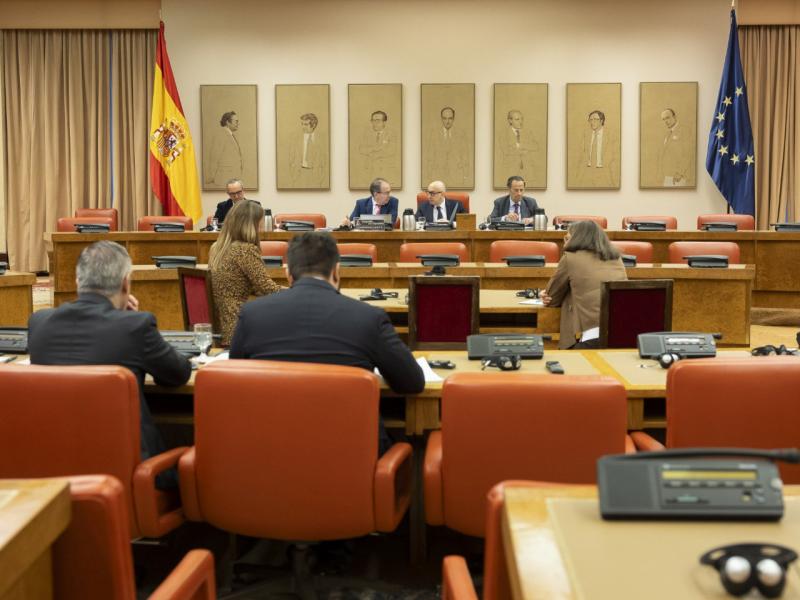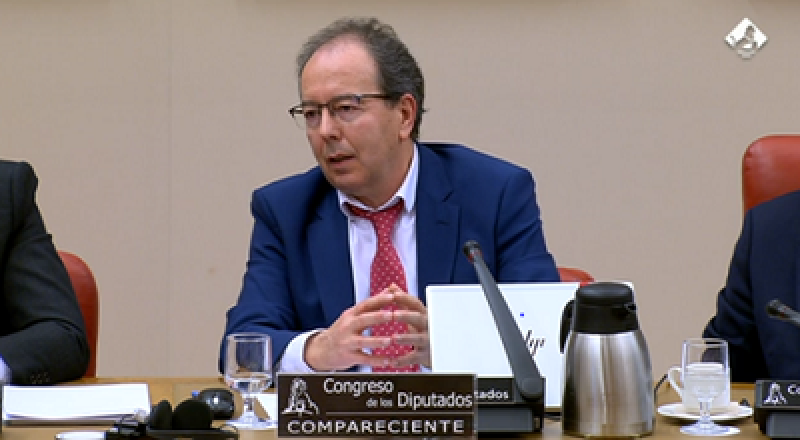The President of the Council for Transparency and Good Governance (CTBG), José Luis Rodríguez Álvarez, appeared today at his own request in the Finance and Public Service Committee of the Congress of Deputies to present the Report of Activities of the Council for the financial year 2023.
In his speech, he highlighted how 2023 saw an intensification of the Council ' s work in the two main functions entrusted to it: that of protect the right of access to public information and that of Eassess compliance with active advertising obligations, that is, to monitor whether the subjects required by the Transparency Act publish on their websites or transparency portal the information relevant to the control of their management.
In 2023 2,013 new cases were registered with the Council, of which 90% were complaints of protection of the right of access to public information, a figure that, he stressed, “gives an account of the great practical relevance that this function has for citizens”. Thus, 1,886 complaints were received, of which 62% were filed with entities of the State level and the rest with entities of the autonomous or local level belonging to some of the autonomous communities and cities that have attributed the competence of guardianship in this matter through agreement.
In terms of the number of claims resolved, in 2023 there was an increase of 36.7% compared to the previous year, with a total of 2,259 cases (1,169 at state level and 1,090 at regional and local level), which, said the President of the Council “constitutes an historic record”.
Ninety-five per cent of the statewide claims were admitted for processing. Of them, cThus two thirds (63.7%) concluded with a stimatory pronouncement in its various forms (total, partial estimate, for formal reasons or with a retroactive order). At the regional and local level, the magnitudes are similar: 95.1% were admitted to the procedure and 71.5% were estimated.
In his speech, the President of the Council again warned of Two serious dysfunctionalities in the management of requests for access to public information that the institution has repeatedly denounced and that the organs and entities of the General Administration of the State and those at the regional and local levels continue to fail to correct.
The first is the large number of cases in which the obligated subjects do not respond in time to requests for public information Formulated by the citizens, and which are therefore understood to be denied by administrative silence. In 2023, 33.7% of the complaints received by the Council against bodies and agencies of the state level were presented by administrative silence, a percentage that rises to no less than 85.4% in the complaints of the autonomous and local areas of the communities with which the Council has an agreement.
The other serious pathology, he stressed, is the existence of a Significant percentage of resolutions that are firm and fully binding because they have not been appealed and yet are not complied with. The Council continuously monitors the status of each resolution and regularly reminds the bodies concerned of non-compliance, urging them to proceed with implementation without delay. In addition, every three months, it publishes the compliance status of all its resolutions on the website for public knowledge.
“But -lamented the President of the Council- andThis is all we can do because the law does not attribute more powers to us and the experience of these years shows that it is not enough to put an end to a practice that is clearly unacceptable: there is no possible justification for the administrations not to implement firm resolutions that bind them legally. This is the greatest anomaly of the Spanish system of access to public information, which must be corrected as soon as possible through a reform of the law in order to give the guarantor bodies the power to impose coercive fines in order to ensure compliance with their resolutions, regardless of whether a sanctions regime can also be envisaged for the most serious cases.”.

Evaluation of active advertising obligations
The Council’s other large area of activity, that of ensuring compliance with active advertising obligations, was also very significantly enhanced in 2023. The degree of compliance with the law of 254 agencies or entities was evaluated individually (35.1% more subjects evaluated than in 2022), which resulted in the production and publication on the web of 361 reports (32.7% more). All evaluations were carried out exclusively by Council officials and with their own resources, without outsourcing any process.
In 2023, the evaluation focused on institutional public sector entities, and private entities receiving grants, which are the groups of obligated subjects in which a low compliance rate remained. The results show that the degree of compliance with legal obligations in these sectors is still very low in general, although it is also necessary to make the exception that in all groups there are good examples of compliant entities. In the institutional public sector the average degree of compliance was only 43.3%, and in the case of private entities the average does not reach 35%.
The AGE Transparency Portal, which has also been evaluated, has improved by 8% compared to the previous year, which is an important advance, but still stands at 81%.
The Council, in its evaluation reports, not only verifies the state of compliance with the obligations of active advertising, but also makes specific recommendations to each subject evaluated to remedy the deficiencies observed. This practice, Rodríguez stressed, is helping to improve the level of transparency year after year, to the extent that the recommendations are implemented. However, he denounced, there are public and private entities that even after two evaluations with the corresponding recommendations continue to violate their transparency obligations. Therefore, as in the area of complaints, he advocated that the Council be given coercive powers to enforce the law.
A staff of 30 personnel as of December 31, 2023
In his speech, he recalled that, despite the intensification of the Council’s activity, the institution has a staff “still very modest” for the workload and the functions it has entrusted. In 2023, the Council had a budget of 3.37 million euros - 12.5% more than the previous year. His team, as of December 31, had 30 personnel.
He highlighted some important advances in the process of modernization and strengthening of the institution, fulfilling the objectives set in the Strategic Plan 2022-2025, such as the adoption of a new Statute replacing the 2014 one, which was outdated and not suited to the functions and needs of the Council, and which was finally approved in July 2024. The Council, he recalled, is about to complete its first ten years of operation and over the next year other improvement projects will be completed, such as the development of a new website and the revision and updating of the interpretative criteria on the Transparency Act.
Balance of ten years of validity of the Transparency Act
The president stressed that on December 10, it will be 10 years since the full entry into force of the Transparency Act. While very significant progress has been made in all areas and administrations, he noted that “Much remains to be done, because we are still in the middle stage of building our public transparency system. The process is by no means complete and we even see that in recent months there have been some setbacks that are worrying.”.
He stressed that The 2013 Transparency Act has loopholes and technical shortcomings that need to be corrected, and on which there is already a high degree of consensus. “In this regard, the government announcement on the upcoming presentation of a Preliminary Draft Open Administration Law, which will include the reform of the Transparency Law, opens a very positive expectation, which hopefully will be confirmed soon.”, he said.
“And -added - As the two political parties with the highest representation in the General Courts carried the commitment of the reform of the Transparency Law in their electoral program, it should be feasible to move forward in this legislature. If it is not achieved, it will be difficult to explain and I dare to venture that it will have a political cost because the demand for more transparency in public affairs is widespread among Spanish citizens, as evidenced by last year’s Eurobarometer, and probably even greater today. “
He also pointed out that, being very important the reform of the law, it is not enough, since the Institutional structures of the transparency system are still very weak, both those of the guarantor bodies and of control and supervision of public transparency, and the administrative structures dedicated to complying with the obligations of active publicity and to meet the requests for access to information of citizens, which in general, “they are still far from having the necessary minimum endowment”. In addition, in many cases, there is still a certain lack of knowledge of the contents of the law among those responsible for the obligated subjects, which shows that “la culture of transparency has not yet penetrated sufficiently in public administrations”.
Since October 1, Spain co-chairs the Open Government Alliance, so for a year it will occupy a position of great relevance and will be at the center of the eyes of the entire international community of transparency. “This opportunity should not be missed to be exemplary, address the pending reforms and adopt the necessary measures to place our country among those who lead the ranking of more transparent States, which is where we should be for multiple reasons”, he concluded.

